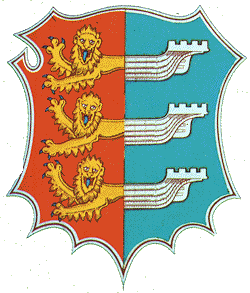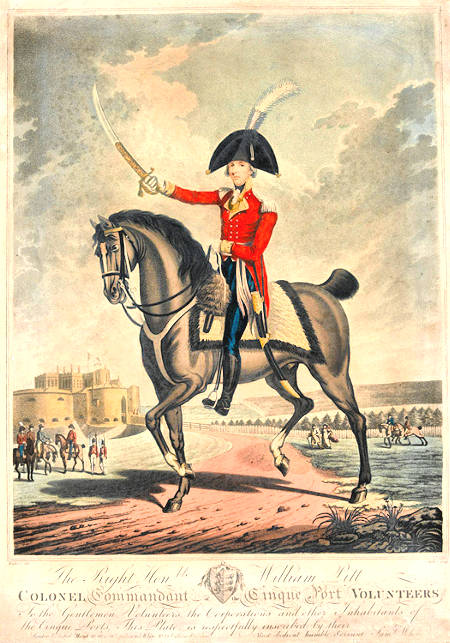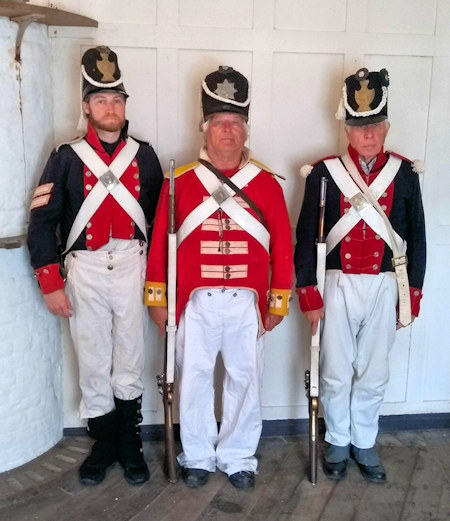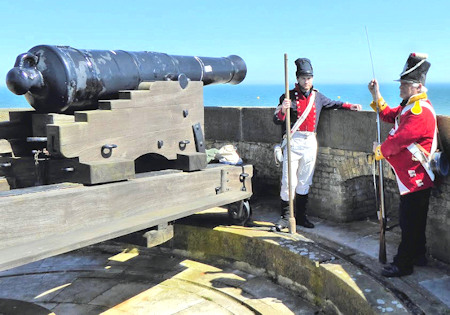Cinque Ports Volunteers
In 1794, owing to the fear of invasion from France, the government encouraged the raising of extra troops for the defence of the Realm, including a large body of Cavalry and Infantry recruited by voluntary enlistment.
The Cinque Ports consist of Hastings, New Romney, Hythe, Dover, and Sandwich, along with the two Ancient Towns of Winchelsea and Rye. Additionally, there were eight limbs'.
Local companies of part-time volunteers were formed in the Cinque Ports and remained in service until the signing of the Peace of Amiens in 1802. However, a year later In May 1803, war broke out again with France. Napoleon immediately made it clear he meant to attempt an invasion of Britain, and positioned 150,000 men along the Channel coast for the purpose. Henry Addington's government turned again to volunteers, and the Cinque Ports once more responded enthusiastically -- this time with the personal involvement of the Lord Warden of the Cinque Ports, former prime minister William Pitt the Younger.

Cinque Ports Crest
Pitt had accepted the sinecure of Lord Warden in 1792. After resigning the premiership in 1801 and selling his country home in 1802 he retired to the Lord Warden's official residence, Walmer Castle, and lost no time in responding to the Addington government's request in June 1803 for prominent local gentlemen to raise volunteers.
Pitt wrote in his capacity as Lord Warden to Lord Hobart, the Secretary of State for War, on 27 July 1803:
I have the honour of transmitting enclosed a Memorandum of the proposal which I laid before your Lordship this morning for raising a Regiment of Volunteers within the Cinque Ports, to serve in case of invasion in any part of England, and to consist of three Battalions: and I have to request that your Lordship will submit the same to His Majesty's consideration.
The proposal was accepted, and three thousand men were raised between July and November 1803. The officers were all local gentry and aristocracy, but the rank and file were mostly skilled labourers and artisans who could afford to leave their businesses for long stretches.
The Volunteers rapidly acquired an excellent reputation even among military circles. While not on Permanent Duty the Volunteers were required to drill for at least two days a week, and although attendance seems to have varied from attending the full 24 days service in three months to attending only one day, Sir David Dundas, overall military commander of Kent and Sussex, considered that the Volunteers were fit to fight with regular troops. This was evident after the occasion in October 1803 when the new Volunteers fired four hundred shots at eight targets with a success rate of only one in five.

William Pitt as Colonel of the Cinque Ports Volunteers
In July 1804 Kent was divided into three Volunteer Brigades, and the Cinque Ports Volunteers were incorporated into the Cinque Ports Infantry Brigade along with the Deal Infantry and the Ramsgate and Margate Marksmen under the overall command of Brigadier General Charles Hope.
The Volunteers were required to help man the new system of defence which was being constructed along the Kent and Sussex coast. Along with several regiments of Militia from around the country, the Volunteers were expected to garrison forts, redoubts, batteries and other defences.
They later also helped man the Martello towers which were built along the coast between 1805 and 1809 and acted as signallers on the semaphore posts.
Other duties included "aid[ing] and assist[ing] the Revenue officers in the exertion of their duty", particularly in the fight against smuggling, which was, of course, rife along the Kent and Sussex coasts. The duty of quelling civil unrest also remained an important raison-d'être for the Volunteer force.
This regiment remained in service until 1810 when changes in the militia system came into force.

Cinque Ports Volunteers
The demands of the Peninsular War necessitated the drafting of militiamen into the regular army and the establishment of a new local militia, primarily for home defence. The Local Militia Act of 1808 created a new reserve force intended to replace the volunteers and in 1810 the Earl of Liverpool, who had succeeded Pitt as Lord Warden, established the Cinque Ports Regiment of Local Militia.
With the end of the Peninsular War in 1814 and the eventual defeat of Napoleon in 1815, the need for a reserve force ceased. The volunteers were disbanded in 1814 and the local militia was disembodied in 1816.

Cinque Ports Volunteers on Martello24 gun platform


















